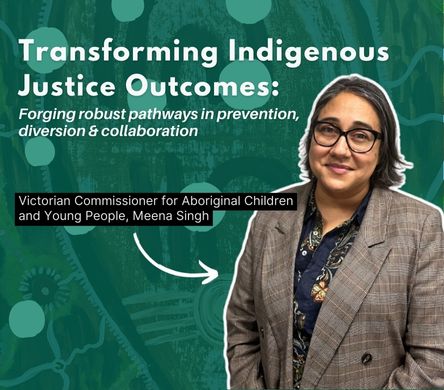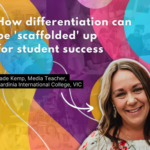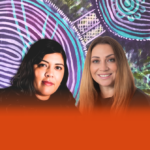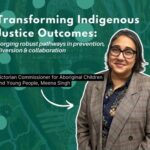First Nations voices to transform Indigenous justice outcomes

“It is really important that when we look at ‘how do we address the challenges that children and young people are facing’…we listen to them.”Meena Singh is the Commissioner for Aboriginal Children and Young People in Victoria. Her work takes on many forms, but in particular, her role boils down to giving children a voice.
When things considered relatively minor, such as Victoria vowing to raise the age of criminal liability to 12-years-of-age, are enacted, many commentators deride it at the first sign of youth crime. When these opinion articles are written, they inevitably quote other commentators, police, and politicians opposed to measures to stop children being incarcerated. Ms Singh says the people that should be heard from are the children themselves — or, at least, voices on their behalf.
“We often see children and young people left out of the conversation themselves,” Commissioner Singh said.
“[In Victoria] we have lots of people talking about children and young people, but not to children and young people, about what should be done to make sure that they’re not offending.”
This has seen an appalling level of children held in custody across the country —some as young as ten years of age.
And despite some goodwill, many governments continue to discount First Nations voices.
In New South Wales, despite calls from Indigenous legal and human rights groups, the government enacted new bail laws, which the attorney-general accepted would see more children spend time in prison, and which were called a “betrayal” of children by the NSW/ACT Aboriginal Legal Service.
In Queensland, the Human Rights Act was twice suspended in 2023, to allow more children to be charged for breaches of bail and for them to be held in adult watch houses with some of the state’s most violent people.
The Queensland government took away the tenet of detention only as a last resort, earlier this year, “directly contravening” the findings of the Royal Commission into Aboriginal Deaths in Custody, as well as a principle in the United Nations’ convention on the Rights of the Child, which Australia has signed and ratified.
In all of these decisions, children were not consulted. Nor were the voices of people advocating on their behalf listened to.
The struggle to accurately transform Indigenous outcomes is real, both in delivery and in maintenance.
Commissioner Singh points to the Yoorrook Justice Commission, which produced an interim report calling for a swathe of measures, including a stand-alone First Nations child protection system, after hearing from countless experts and people with lived-experience — including members of the Stolen Generations.
It was not taken up by the Victorian government, leaving many to feel like their experiences in sharing their trauma was invalidated.
“People are absolutely exhausted about numerous reports that Aboriginal people invest in and Aboriginal put their time and energy into, to make sure the tour of the story is told only to have recommendations not be taken up,” Commissioner Singh said.
Noting the recommendations didn’t contain anything “radical,” she argues: “There’s a groundswell of a lot of actions that we need to see implemented”.
She will be one of many experts speaking at the Transforming Indigenous Justice Outcomes conference, a two-day event focusing on exploring comprehensive approaches to breaking the cycle of incarceration.
Taking place on Gadigal Country, the event is unique as the majority of speakers are First Nations, speaking from both positions of lived experience and self-determination for ways to alleviate a crisis of Aboriginal men, women and children being held in custody by the state.
With a focus on storytelling, reflection and connection, the conference is designed to elevate the voices of First Nations people who are rarely given a platform in Australia, despite disproportionately featuring in a number of metrics involving incarceration and out-of-home care.
They will take on a wide-range of outcomes and suggestions, reflective of the broad and knowledgeable range of speakers over the two days, but with the commonality of tackling the root causes which lead to interactions with the criminal justice system, as well as shining a spotlight on successful programs that have delivered community-driven and effective alternatives to detention.
Commissioner Singh said her discussion at the Transforming Indigenous Justice Outcomes forum will be about bringing some “perspective and understanding” to that space.
“Really understanding that a lot of the kids who are involved or become involved with the criminal legal system, the kids that maybe haven’t been brought up with the opportunities that so many people take for granted,” she said.
It is why events like this are so vital, but also why they shouldn’t be considered so exceptional.
Too often, forums that market themselves as transformative, feature people who aren’t Indigenous, and who aren’t properly speaking for the rights of some of the most disadvantaged in the country.
The Transforming Indigenous Justice Outcomes conference does this.
Commissioner Singh notes it is all about centring the voices of those who aren’t always heard to transform their outcomes.
“How do we re-humanise children and young people in these discussions?” Commissioner Singh asks.
“Language, particularly in the media…demonises these children [and] puts up stereotypes around them. How do we bring diversity to their stories, and make sure we’ve got the responses that add to their needs?”
The Transformative Indigenous Justice Outcomes event will take place from September 11-12 on Gadigal Country in Sydney, with an online option also available.
Article originally posted by National Indigenous Times




